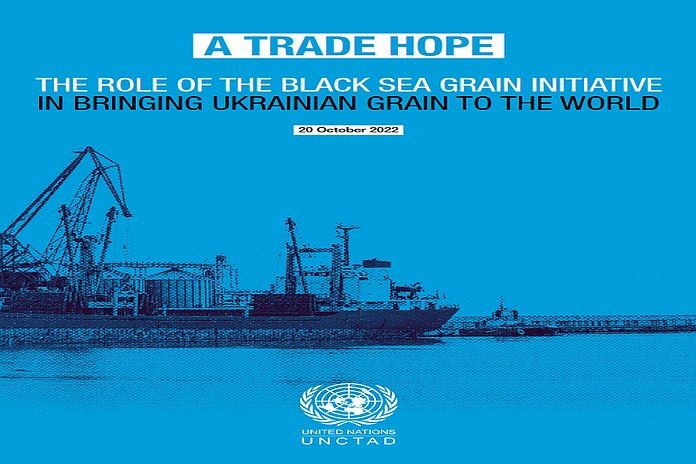GENEVA, Switzerland – An UNCTAD report published on 20 October shows how the Black Sea Grain Initiative signed in July 2022 to resume exports of Ukrainian grain via the Black Sea amid the ongoing war has offered hope and shown the power of trade in times of crisis.
The report underlines why it’s critical to renew the initiative next month.
Thanks to the initiative, port activity in Ukraine is picking up and large shipments of grain are reaching world markets. As of 19 October, the total tonnage of grain and other foodstuffs exported through the initiative had reached almost eight million metric tons.
“The UN-led Initiative has helped to stabilize and subsequently lower global food prices and move precious grain from one of the world’s breadbaskets to the tables of those in need,” the report says.
The Food Price Index published by the UN Food and Agriculture Organization has shown that the prices of global food staples have declined in recent months – by about 8.6 percent in July, 1.9 percent in August and 1.1 percent in September.
But with the initiative ending in November and its renewal uncertain, the prices of some commodities, such as wheat and maize, are rising again, the report warns.
Without the initiative, there is little hope for providing food security, especially in developing and least-developed countries.
Increasing port activity
As the war erupted in Ukraine, the world watched as valuable grain corridors were closed off. Weekly ship departures from Ukrainian ports plummeted.
There was a marginal recovery in subsequent weeks but port departures remained considerably below their 2021 levels. After the signing of the UN-led initiative, there was a gradual rise in ship departures.
While shipments are still about 40 to 50 percent below the pre-war period, the trend is in the right direction.
Port activity in Ukraine is rising
Number of departures of all cargo ships by week
Under the UN-led initiative, three seaports have been reopened – Odesa, Chornomorsk, Pivdennyi/Yuzhny. As a result, the number of port calls has increased and more importantly, the volumes carried have risen significantly.
Weekly tonnage of grain shipped under the initiative reached 1.2 million tons by September. This is still below 2021 levels, but the gap is closing.
Grain gates reopened
The initiative reopened the grain gates of Ukraine to the world, and particularly to developing countries.
Maize and wheat account for more than 70% of the nearly 8 million tons of grain that have left Ukrainian ports under the initiative. Nearly 20 percent of the wheat exports have gone to least developed countries (LDCs) with vulnerable populations.
The initiative doubled the amount of wheat shipped to LDCs between August and September – about half a million tons.
But wheat exports to LDCs between January and September 2022 totalled less than 1 million tons. This implies an export gap of 1.2 million tons with respect to 2021. More needs to be done to match previous levels of exports.
Pushing down food prices
The initiative has helped to make grain more available and eased pressure on food prices. This has in turn helped to improve global access to food, particularly for the poorest and most vulnerable.
The prospect of the initiative and the reopening of the Black Sea ports helped to push down historically high market prices.
But prices are rising again amid mounting concerns about whether the initiative will be renewed, and the threat of further disruptions to trade in the Black Sea and the closure of grain corridors.
“In a context where trade is very uncertain, signals matter very much,” UNCTAD secretary-general Rebeca Grynspan said. “When there is no clarity, no one knows what is going to happen, and speculation and hoarding take over.”
Wheat and maize prices are still at historically high levels. This weighs on the affordability of basic foods and poses a risk to food security globally.
This is one more reason why the renewal of the UN-led initiative is important for developing countries.
The report was produced with contributions from the Joint Coordination Centre for the Black Sea Grain Initiative, comprised of senior representatives from Ukraine, the Russian Federation, Türkiye and the UN, which ensures the safe maritime transportation of grain and other foodstuffs from the three key Ukrainian ports in the Black Sea to the rest of the world.





